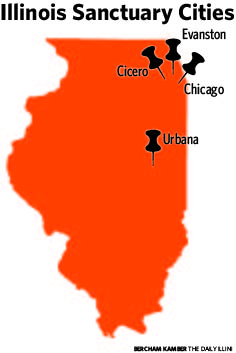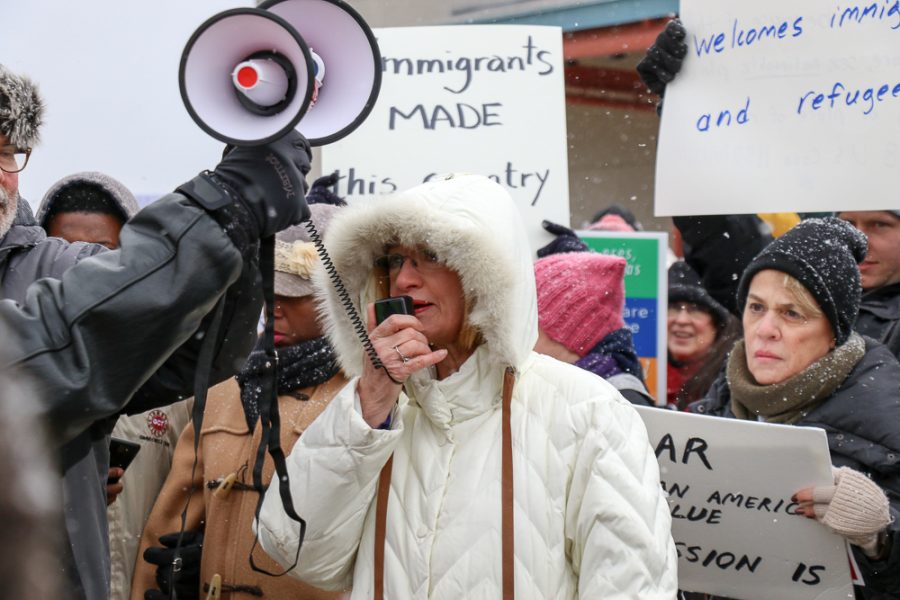Legality questioned on Trump’s order to cut funding for sanctuary cities
Urbana Mayor Laurel Pressing speaks to the protestors, saying, “This is a nation of laws. I think the new president is going to find that out.”
Feb 6, 2017
President Donald Trump vowed in an executive order on Jan. 25 to cut federal funding for sanctuary cities and counties, a move that could potentially harm Champaign County.
Urbana has held sanctuary status since 1986. While standards vary, most sanctuary cities will limit involvement between local police enforcement and federal immigration officers.
This includes the city’s refusal to use state tax funds to enforce federal immigration laws and the decision not to keep illegal immigrants in jails on detainers issued by Immigration and Customs Enforcement.
“These community policing policies are designed to make communities safer by encouraging communication between local police and the residents of the community, and do not restrict federal law enforcement activities,” wrote Adjunct Law Professor Lauren Anaya in an email.
These policies allow undocumented residents to seek out community services, such as police help or healthcare, without the fear of being asked immigration status.
Get The Daily Illini in your inbox!
The mayor of Urbana, Laurel Prussing, said she believes the city is “on very good legal ground” in regards to its sanctuary practices.
“We’re not saying if someone commits a crime and they’re an illegal immigrant we won’t arrest them,” Prussing said. “I believe that President Trump is not following the law; he’s just making it up as he goes along.”
Prussing said Urbana has had a strong history of being “pro-human rights” and will not discriminate against residents on the basis of religion or origin.
“You don’t do things based on money. You have to stand up for your principles,” Prussing said.

Urbana’s policy, originally enacted to protect Central American refugees, was drafted by law professor Francis Boyle in 1986.
“Reagan did the same thing back in the 1980s when we set up the original sanctuary movement,” Boyle said. “He tried to threaten us with the loss of red revenue funds and it turned out to be a hollow threat.”
Both Prussing and Boyle believe that Trump is not going to cut federal funds from sanctuary cities, a move that would result in several legal battles.
Trump’s executive order contains a provision in section nine stating it is the executive branch’s policy to ensure states will comply with 8 U.S.C. §1373, which addresses communication between government agencies and the Immigration and Naturalization Service.
“Section 1373, however, does not impose an affirmative obligation to collect information from private citizens regarding their immigration or citizenship status, and it does not require local officials to take action upon obtaining information that someone is a non-citizen,” Anaya said.
There is no formal definition to what constitutes a sanctuary city, making it harder for the federal government to discriminate against cities.
The Trump administration plans to cut funding by restricting future federal grants, which Anaya said is problematic due to the fact that Congress distributes most grants.
“Still, the Trump administration could put pressure on local communities by cutting off a number of grants administered by federal agencies,” Anaya said.
Anaya cited varying court cases and precedents set that could strengthen the argument in favor of sanctuary cities.
“In the past, courts have held that the federal government can only take away funding that is related to the policy involved,” Anaya said. “They have also ruled that the courts cannot use funding decisions to coerce state action.”
Both Prussing and Anaya referred to the Tenth Amendment, which prohibits the federal government’s interference in state affairs.
“The federal government cannot demand local police collect immigration status information from suspects and local law enforcement can tell their officers not to request it,” Anaya said. “It is the responsibility of the federal government to establish immigration policy and enforce the nation’s immigration laws.”
On Feb. 1, Texas Gov. Greg Abbott announced he would restrict $1.5 million in grant money to a Texas county which abides to sanctuary practice, a move that Anaya said has slightly stronger legal ground.
“We are dealing with a state governor trying to control state and local officials as opposed to federal government interference in state affairs,” Anaya said. “It is worth noting that state attempts to affect immigration have historically met with legal challenges in the courts and the Texas case is likely to be no different.”
While the University is not a sanctuary campus, the University Police Department’s policy states they do not inquire into a resident’s legal status.
“UIPD does not arrest anyone solely based on their immigration status and does not act on detainers iassued by Immigrations and Customs Enforcement,” said Patrick Wade, University police spokesman, in a Feb. 2 community statement.
Wade added the Champaign County jail does not hold individuals by ICE detainers.






